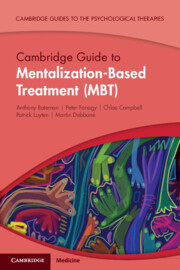Book contents
- Cambridge Guide to Mentalization-Based Treatment (MBT)
- Cambridge Guides to the Psychological Therapies
- Reviews
- Cambridge Guide to Mentalization-Based Treatment (MBT)
- Copyright page
- Contents
- Preface
- A Note from the Series Editor
- Acknowledgments
- Part I Overview of the Model
- Part II The Mentalization-Based Treatment Model in Practice
- Part III Application and Adaptations for Mental Health Presentations
- Chapter 6 Narcissistic Personality Disorder
- Chapter 7 Antisocial Personality Disorder
- Chapter 8 Avoidant Personality Disorder
- Chapter 9 Depression
- Chapter 10 Psychosis
- Chapter 11 Trauma
- Chapter 12 Eating Disorders
- Part IV Application of Mentalization-Based Treatment in Different Populations and in Different Settings
- Index
- References
Chapter 6 - Narcissistic Personality Disorder
from Part III - Application and Adaptations for Mental Health Presentations
Published online by Cambridge University Press: 18 May 2023
- Cambridge Guide to Mentalization-Based Treatment (MBT)
- Cambridge Guides to the Psychological Therapies
- Reviews
- Cambridge Guide to Mentalization-Based Treatment (MBT)
- Copyright page
- Contents
- Preface
- A Note from the Series Editor
- Acknowledgments
- Part I Overview of the Model
- Part II The Mentalization-Based Treatment Model in Practice
- Part III Application and Adaptations for Mental Health Presentations
- Chapter 6 Narcissistic Personality Disorder
- Chapter 7 Antisocial Personality Disorder
- Chapter 8 Avoidant Personality Disorder
- Chapter 9 Depression
- Chapter 10 Psychosis
- Chapter 11 Trauma
- Chapter 12 Eating Disorders
- Part IV Application of Mentalization-Based Treatment in Different Populations and in Different Settings
- Index
- References
Summary
A mentalizing framework for understanding narcissism is outlined, and the resulting modifications of basic mentalization-based treatment (MBT) for narcissistic personality disorder are discussed. Treatment of patients with pathological narcissism requires an emphasis on empathic validation and support of the vulnerable “I-mode.” The dangers of not recognizing low mentalizing in narcissistic functioning are also discussed, as both patient and clinician can fail to recognize pretend mode, which may masquerade as “we-mode.” Together the patient and the therapist may then set up a pretend therapy that can be interminable and that functions only to fuel the mental narcissistic structure. A clinical example of a patient in treatment is used to illustrate the process of treatment.
Keywords
- Type
- Chapter
- Information
- Cambridge Guide to Mentalization-Based Treatment (MBT) , pp. 155 - 173Publisher: Cambridge University PressPrint publication year: 2023



